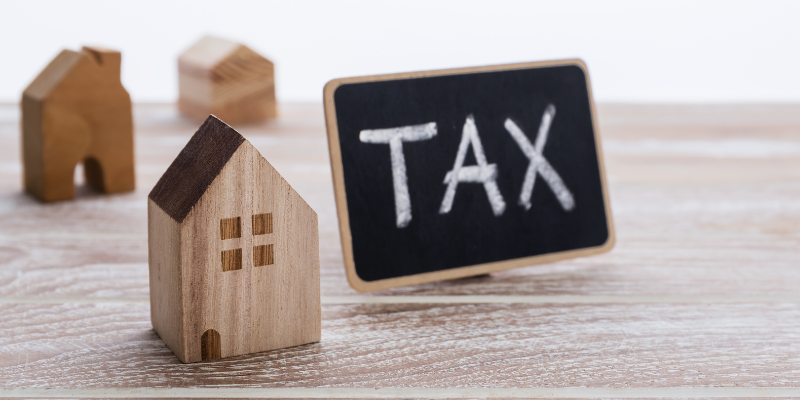
Understanding Capital Gains Tax in Canada: A Comprehensive Guide
For property owners living in Edmonton, selling their property comes with considerations, including the capital gains tax in Canada. Before selling your house, there are a few things to know regarding how capital gains tax applies to your case.
In Canada, capital gains are realized when an asset is disposed of at a value greater than its purchase price. The gain in value from the purchase price to the selling price is termed capital gain.
Typically, 50% of the capital gained is taxable and needs to be reported in the income tax return. However, suppose the sold property was occupied as a principal residence for the entire duration of ownership. In that case, he may be eligible for the principal residence exemption, significantly reducing or eliminating the capital gains tax owed.
Keeping track of the property’s purchase price and any upgrades over the years allows for the precise calculation of the cost base while making tax season minimally painful. Understanding these elements will help Edmonton homeowners sell their houses while complying with Canadian tax regulations. Sunrise Home Buyers can help you stay compliant and make informed decisions when selling your home.
Do You Have to Pay Capital Gains When You Sell Your House in Canada?
When selling your home in Edmonton, understanding whether you need to pay capital gains tax is crucial. A capital gains tax will be implemented in Canada if a property is disposed of at a price that exceeds the purchase price (profit or capital gain). Like in many other regions that levy capital gains taxes, homeowners usually receive some form of mitigation taxation relief in the form of a housing exemption, in this case, the principal residence exemption.
To qualify for the exemption, the Edmonton home must have been your principal residence for all the years you owned the property. If these requirements are satisfied, you may be eligible for a capital gains tax exemption when selling the property.
You must remember that if your property was utilized, even slightly, for rental or business purposes, the exemption does not apply in full, and you will have to calculate the extent of any taxable capital gain. As mentioned, having the proper paperwork and speaking to a professional will assist you greatly in Canadian legislation, especially when selling the house in Edmonton.
Calculating Capital Gains on Real Estate Investments
If you are interested in real estate investment in Edmonton, you should know how to calculate capital gains when selling your assets in the city, as well as understand the tax implications of selling a home. One of the key concerns you should address is calculating your taxable gain and the formula required for it. The selling price of the house and the capital gain represent the surplus value resulting from the difference between the selling price and the adjusted cost base. The purchase price and any other payment value, such as costs, improvements, or renovations made to the house, form its basis.
To also reach the value you feel is correct, consider the transaction expenses, such as real estate professional commissions and legal fees, which can be deducted from the selling price. Please note that only 50% of the calculated capital gain in Canada is considered taxable income.
Homeowners should be aware of exemptions such as the principal residence exemption, which may apply if you have lived in your Edmonton home as your primary residence for all or part of the time you’ve owned it. Properly documenting all related expenses and maintaining detailed records are crucial to ensuring compliance with tax regulations while optimizing potential tax savings on your real estate investment.
Reporting Requirements for Capital Gains on Your Income Tax Return

When selling your Edmonton home, it is crucial to understand the reporting requirements for capital gains tax on your income tax return. Capital gains arise when you sell a property at a higher price than its purchase cost, which must be reported to the Canada Revenue Agency (CRA).
To ensure compliance, accurately calculate the adjusted cost base by considering factors like purchase price, legal fees, and any improvements made to the property. The difference between this adjusted cost base and the sale price constitutes your capital gain.
In Canada, only 50% of this gain is taxable, but reporting it correctly on Schedule 3 of your T1 General Income Tax and Benefit Return is essential. Suppose your sold property was your principal residence for every year you’ve owned it. In that case, you might be eligible for the principal residence exemption, potentially reducing or eliminating the taxable portion of the capital gain.
However, even if claiming this exemption, it’s mandatory to declare the sale with relevant details such as the year of acquisition and proceeds from the disposition. Failing to report these transactions can lead to penalties or reassessments by the CRA, so it’s advisable to maintain thorough records and consider consulting a tax professional for guidance. Contact us for assistance if you have questions or need support navigating these requirements.
Strategies to Minimize Capital Gains Tax When Selling Property
When selling your Edmonton home, understanding strategies to minimize capital gains tax is crucial for maximizing your profit. One practical approach is to leverage the principal residence exemption, which can significantly reduce or even eliminate taxable capital gains if the property has been your primary residence.
Keeping thorough records of all improvements made to the property can also be beneficial, as these costs can be added to your property’s adjusted cost base, potentially reducing the capital gain. If you own multiple properties, consider designating one as your primary residence based on which will yield the most favorable tax outcome.
Timing is another essential factor; selling during a year when your income is lower might place you in a lower tax bracket, reducing the overall tax burden. Consulting with a tax professional who understands Canadian real estate and tax law can provide personalized advice tailored to your situation and ensure compliance while optimizing your financial results.
Navigating Capital Gains Tax for First-time Home Sellers
Navigating capital gains tax for first-time home sellers in Edmonton can be complex, but understanding the basics is crucial for minimizing the financial impact. When you sell your home for cash in Edmonton and other cities in Alberta, the capital gains tax is applied to the profit made from the sale.
For first-time home sellers, it’s essential to know that not all profits are taxable thanks to exemptions like the principal residence exemption. This exemption allows homeowners to potentially avoid paying capital gains tax if they have lived in their home as their primary residence for all or most of the time they’ve owned it.
Calculating your capital gain involves subtracting the original purchase price and any associated costs, such as renovations or legal fees, from your home’s selling price. First-time sellers should also know how holding periods and changes in residency status can affect eligibility for exemptions.
Consulting with a tax professional can provide personalized advice tailored to your situation. It can also help ensure compliance with Canadian tax laws while optimizing your tax position. Understanding these key elements will enable you to navigate the intricacies of capital gains tax effectively when selling your Edmonton home for the first time.
Legal Exemptions and Deductions for Reducing Capital Gains Tax
Understanding the legal exemptions and deductions available when selling a home in Edmonton can significantly reduce your capital gains tax liability. One of the most crucial exemptions is the principal residence exemption, which allows homeowners to sell their primary residence without incurring capital gains tax on the profit.
The property must have been your principal residence for every year you owned it to qualify. Additionally, homeowners should consider any eligible expenses that can be deducted from their capital gain, such as renovation costs and legal fees related to the sale.
Keeping thorough records of these expenses is vital for accurately calculating deductions. Moreover, if you rented out part of your home or used it for business purposes, only a portion of the capital gain might be exempt under this rule.
Understanding these nuances and consulting with a tax professional can ensure you take full advantage of all available exemptions and deductions when selling your property in Edmonton.
How Primary Residence Exemption Affects Capital Gains Tax in Alberta
The primary residence exemption in Alberta is crucial in determining capital gains tax when selling your Edmonton home. Suppose the property you’re selling has been your principal residence every year you’ve owned it. In that case, you may be eligible to claim this exemption, potentially eliminating the need to pay capital gains tax on any profit from the sale.
To qualify, the home must have been used predominantly as your personal living space and not primarily for rental or income-generating purposes. The Canada Revenue Agency (CRA) requires homeowners to report the sale of their principal residence on their tax return to claim this exemption, ensuring that all conditions are met.
Understanding how this exemption applies can significantly impact your financial planning by reducing or negating potential tax liabilities associated with capital gains. In Edmonton and throughout Alberta, utilizing the primary residence exemption effectively can provide substantial savings, allowing homeowners to retain more profits upon selling their homes.
The Role of Holding Periods in Determining Your Capital Gain or Loss

When selling your Edmonton home, understanding the role of holding periods in determining your capital gain or loss is crucial for managing your capital gains tax liability. The holding period refers to when you have owned the property before selling it.
In Canada, if you’ve held your home as a primary residence throughout this period, you may qualify for the principal residence exemption, significantly reducing or eliminating your capital gains tax. However, suppose the property was an investment or rental property. In that case, it becomes essential to calculate how long you’ve held it to determine whether any portion of its appreciation qualifies for favorable tax treatment.
A more extended holding period generally implies a greater potential for profit due to market appreciation, but also necessitates careful consideration of changes in tax laws and property value adjustments over time. Shorter holding periods might result in higher taxable gains as they often reflect speculative investments rather than long-term ownership.
Understanding these nuances helps Edmonton homeowners plan strategically around their sale timing to optimize their financial outcomes while remaining compliant with Canadian tax regulations.
Financial Planning Tips to Optimize Capital Gains From Property Sales
Effective financial planning is crucial when selling your Edmonton home to optimize capital gains and reduce tax liabilities. One strategy is to take advantage of the principal residence exemption, which can significantly lower or even eliminate capital gains tax if the property has been your primary residence.
Keeping accurate records of home improvements and expenses is essential, as these costs can increase your property’s adjusted cost base, reducing taxable capital gains. It’s also wise to consider the timing of your sale; selling during a year when you have lower overall income might result in a reduced tax rate on your capital gains.
Consulting with a tax professional or financial advisor can provide personalized strategies tailored to your situation, ensuring you maximize potential benefits while staying compliant with Canadian tax laws. Additionally, consider reinvesting proceeds into other investment opportunities like RRSPs or TFSAs to manage taxes further efficiently.
The Impact of Home Renovations on Capital Gains Tax Liability
Renovating your Edmonton home can significantly influence your capital gains tax liability when you decide to sell. Home improvements that enhance the property’s value, such as kitchen remodels, bathroom upgrades, or adding a new room, can increase the sale price of your home and consequently affect the capital gains realized.
However, it’s essential to differentiate between repairs and renovations; only substantial improvements that add lasting value qualify for deductions against capital gains. By keeping meticulous records of renovation expenses, homeowners can potentially reduce their taxable capital gain by increasing the property’s adjusted cost base.
This means that the expenses associated with eligible renovations can be subtracted from the selling price when calculating the capital gain. Understanding these nuances in Canadian tax law is crucial for Edmonton homeowners aiming to optimize their financial outcomes upon selling their property.
How Market Conditions Influence Your Potential Real Estate Profits
This is how the market conditions influence the potential real estate profits of your house in Edmonton, Alberta:
- Supply and Demand Dynamics
– Market conditions determine the balance between the number of homes for sale and the number of interested cash home buyers in Calgary and surrounding cities in Alberta, directly affecting your sale price. - Seller’s Market Advantages
– When demand exceeds supply, homes typically sell faster and at higher prices, increasing your potential profits and possibly reducing your capital gains tax burden due to higher gains. - Buyer’s Market Challenges
– In markets with more supply than demand, expect longer selling times, lower offers, and reduced profit margins. - Economic Factors Impacting Property Value
– Interest rates, employment rates, and local economic growth all play key roles. For example, low interest rates can increase buyer affordability, pushing up home values. - Strategic Timing Matters
– Understanding and responding to current market trends is essential to timing your sale effectively, maximizing profits, and managing capital gains tax exposure.
Understanding the Adjusted Cost Base (ACB) for Accurate Gain Calculations
When selling your Edmonton home, understanding the Adjusted Cost Base (ACB) is crucial for accurately calculating capital gains tax. The ACB represents the original purchase price of your property plus any eligible expenses that add to its value over time.
These can include renovations, legal fees, and real estate commissions. Properly documenting these expenses is essential, as they directly affect the calculation of your capital gain by reducing the overall profit subject to taxation.
Failing to account for all allowable adjustments can lead to a higher taxable gain. Keeping thorough records of improvements and associated costs ensures you correctly establish the ACB, which ultimately impacts how much capital gains tax you’ll owe upon selling your home in Edmonton.
Understanding these details helps minimize tax liabilities and ensures compliance with Canadian tax regulations.
Exploring Deferred Payment Options to Manage Large Capital Gains

When selling a home in Edmonton, understanding how to manage significant capital gains is crucial, particularly when considering deferred payment options. These strategies can help spread tax liabilities over time, easing the financial burden that might arise from a significant gain.
One standard method of deferring capital gains tax is through seller financing. This option allows the seller to receive payments over several years rather than a lump sum, resulting in smaller annual income increases and potentially lower tax brackets yearly.
Another approach involves installment sales agreements, where the capital gain is reported as payments are received, aligning taxable income with actual cash flow. Utilizing these deferred payment arrangements requires careful planning and adherence to specific IRS guidelines to ensure compliance and maximize benefits.
When selling property in Edmonton, it’s advisable to consult with a tax professional or financial advisor who understands Canadian tax laws and can tailor strategies to your unique circumstances.
Cross-border Considerations: Selling Canadian Property as a Non-resident
When selling Canadian property as a non-resident, particularly in Edmonton, understanding the implications of capital gains tax is crucial. Non-residents face specific tax obligations that differ from those of Canadian residents.
You may be subject to withholding tax requirements upon selling your Edmonton home. Typically, 25% of the gross sales proceeds must be withheld and remitted to the Canada Revenue Agency (CRA) as part of compliance with Canadian tax laws.
To potentially reduce this amount, you must file a Certificate of Compliance by submitting Form T2062 or T2062A to the CRA before or immediately after the sale. This certificate allows for a calculation based on the actual capital gain rather than the gross proceeds.
It’s important to note that any capital gains realized from the sale are taxable under Canadian law, and filing a Canadian income tax return is required to report this gain accurately. Double taxation can sometimes occur if your country of residence also taxes foreign income; however, many countries have tax treaties with Canada that could mitigate these effects by allowing for foreign tax credits or exemptions.
Consulting with a cross-border tax specialist can help navigate these complexities and ensure compliance while maximizing potential savings on capital gains taxes when selling your Edmonton property as a non-resident.
Common Mistakes to Avoid When Filing Taxes on Property Sales
When selling your Edmonton home, it’s crucial to avoid common mistakes that can lead to unexpected capital gains tax liabilities. One frequent error is failing to accurately calculate the property’s adjusted cost base, which involves considering any improvements or renovations made over time.
Overlooking these expenses can result in an inflated capital gain and consequently higher taxes. Another mistake is neglecting to designate your home as a principal residence for every year you owned it when applicable, which could significantly reduce or even eliminate your taxable gain due to the principal residence exemption.
Sellers often forget to include all relevant documentation, such as receipts for eligible expenses and pertinent legal papers, essential for substantiating claims during an audit. Misunderstanding the rules around partial property sales or changes in use can also lead to errors; these situations may require a more nuanced tax strategy, and professional advice should be sought.
Finally, not staying informed about recent changes in tax legislation related to property sales might result in non-compliance or missed opportunities for deductions and exemptions that could lower your overall tax burden.
Comparing Provincial Variations in Real Estate Capital Gains Tax
When examining capital gains tax on real estate sales, it’s essential to consider the provincial variations that can affect homeowners in Edmonton and beyond. Edmonton is located in Alberta, which has no provincial sales or land transfer tax, which can affect how capital gains are calculated compared to other provinces.
While the federal government imposes a consistent capital gains tax rate across Canada, provincial policies can influence overall financial outcomes when selling property. For instance, some provinces have additional taxes or fees that may indirectly impact the net profit from a home sale.
Understanding these differences is crucial for Edmonton homeowners to plan their real estate transactions effectively and anticipate potential tax liabilities. By being aware of federal and provincial tax regulations, sellers can better strategize their financial decisions and optimize any profits realized from selling their homes.
Is there a 50% Capital Gains Tax in Canada?
Understanding the intricacies of capital gains tax is crucial when selling your Edmonton home. In Canada, capital gains are taxed at 50%, meaning only half of the capital gain amount is subject to taxation.
If you sell your property for more than its purchase price, only 50% of the profit will be taxable. Edmonton homeowners should recognize how this 50% inclusion rate affects their financial outcomes when selling a home.
However, if the property is your principal residence, you may qualify for the principal residence exemption, potentially eliminating the capital gains tax. Properly navigating these regulations can significantly impact your tax obligations and overall financial planning when dealing with real estate transactions in Canada.
Consulting with a knowledgeable tax professional or real estate advisor can provide valuable insights specific to Edmonton’s housing market and ensure compliance with Canadian tax laws regarding capital gains.
How Much Capital Gains Tax on $300,000?
When selling a home in Edmonton, it’s crucial to understand how capital gains tax applies, especially when dealing with significant amounts like $300,000. In Canada, capital gains tax is levied on the profit from selling an asset such as real estate.
However, not all of this gain is subject to taxation. Typically, 50% of the capital gain is taxable.
Therefore, if you sell your Edmonton home and realize a gain of $300,000, only $150,000 would be considered taxable income; this amount is then added to your other sources of income for that year and taxed according to your income tax rate.
It’s important to note that if the property was your principal residence for every year you’ve owned it, you might qualify for the principal residence exemption, which can significantly reduce or even eliminate the capital gains tax owed. Understanding these nuances can help homeowners effectively plan their finances and minimize their tax liability when selling property in Edmonton.
Do you need to sell your home? Sell quickly, avoid costly repairs, or prefer a hassle-free sale. Sunrise Home Buyers is here to help. We offer fair cash offers, handle all the details, and make the process seamless. Ready to sell or have questions? Call us at (587) 982-7576 for a no-obligation offer. Get started today!
| TAX SYSTEM | CAPITAL GAIN TAX | OUTLAYS | TAX EXEMPTION | TAX RATES | MARGINAL TAX RATE |
| MARGINAL TAX | ALBERTA’S | ALBERTANS | MORTGAGE | MORTGAGE RATES | EXPENDITURES |
| SHARES | CAPITAL LOSSES | CAPITAL LOSS | TRUST | INTER VIVOS TRUST | STOCK |
| CORPORATIONS | CAPITAL COST | TAX-FREE SAVINGS ACCOUNT | TAX-FREE SAVINGS ACCOUNT (TFSA) | TAX ON PROPERTY | PROPERTY TAX |
| PROPERTY TAXES | TAX YEARS | REALTOR | RETIREMENT SAVINGS | PENSION PLAN | FISHING |
| EQUITY | DIVIDENDS | TAX-DEFERRED | REGISTERED RETIREMENT SAVINGS PLAN | REGISTERED RETIREMENT SAVINGS PLAN (RRSP) | HST |
| CAPITAL EXPENSES | CAPITAL EXPENDITURES | RENTAL INCOME | FARM | TORONTO | TORONTO, ON |
| RETIREMENT | REGISTERED EDUCATION SAVINGS PLAN | REGISTERED EDUCATION SAVINGS PLAN (RESP) | RESP | EXCHANGE RATE | INBOX |
| COMMON-LAW | REGISTERED CHARITY | REGISTERED CHARITIES | CHARITY | CAPITAL ASSET | |
| BROKERAGE | BROKERAGE FIRM | BROKER | FEDERAL BUDGET | SECURITIES | RDSP |
| REGISTERED DISABILITY SAVINGS PLAN | ONTARIO | MUTUAL FUND | LAWYER | FEDERAL INCOME TAX | INCOME TAX LAW |
| FLIPPING HOUSES | FLIPPING | DONATIONS | DOLLARS | TAX ON DIVIDENDS | DIVIDEND TAX CREDITS |
| DIVIDEND TAX | DISABILITY | DISABILITIES | COMMON-LAW PARTNER | CANADIAN DOLLARS | WASH SALES |
| TAX-LOSS HARVESTING | SAVINGS ACCOUNT | SASKATCHEWAN | QUÉBEC | PRIVACY | NUMBER |
| NOVA SCOTIA | NEWFOUNDLAND AND LABRADOR | NEW BRUNSWICK | MUTUAL FUND TRUST | MANITOBA | LABRADOR |
| INFLATION | EMAIL ADDRESS | EDUCATION | DEDUCTIBLE | DEBT | COTTAGE |
| CABIN | CONDOMINIUM | CONDO | CHILD | CHILDREN | BRITISH COLUMBIA |
| BONDS | TO PAY TAX | PAY TAX ON | TO PAY TAX ON | CAPITAL GAINS OR LOSSES | THE PROPERTY IS YOUR |
| THE PROPERTY IS YOUR | PROPERTY AS YOUR PRINCIPAL | SALE OF THE PROPERTY | THE CAPITAL GAINS INCLUSION | CAPITAL GAINS INCLUSION RATE | CANADA REVENUE AGENCY CRA |
| SUBJECT TO CAPITAL GAINS |
